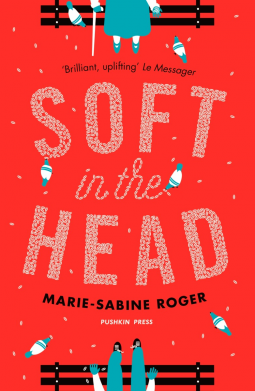
Soft in the Head
by Marie-Sabine Roger
This title was previously available on NetGalley and is now archived.
Send NetGalley books directly to your Kindle or Kindle app
1
To read on a Kindle or Kindle app, please add kindle@netgalley.com as an approved email address to receive files in your Amazon account. Click here for step-by-step instructions.
2
Also find your Kindle email address within your Amazon account, and enter it here.
Pub Date Jun 28 2016 | Archive Date May 02 2016
Description
In this touchingly comic tale of an unusual friendship, that first conversation opens a door into a world Germain has never imagined—the world of books and ideas—and gives both him and Margueritte the chance of a happiness they thought had passed them by.
Advance Praise
"Unique. The sort of book that makes you want to hug the author to thank them for the happiness they have given you." -- Focus Vif
"A novel of hope." -- Femme Actuelle
"A breath of tender fresh air, written in a tone as funny as it is clever." -- France Soir
"A deeply moving, sunny novel, full of humanity." -- La Marseillaise
"One of those occasional publishing miracles." -- Le Figaro
Available Editions
| EDITION | Other Format |
| ISBN | 9781782271581 |
| PRICE | $14.95 (USD) |
Featured Reviews
 Rosemary S, Librarian
Rosemary S, Librarian
Germain, a 45 year old man with learning disabilities sees Margueritte, an elderly woman at the park every day where she reads and feeds the pigeons. The two form a friendship when Margueritte begins reading to Germain; she’s kind to him and awakens a love of reading he never knew he had. As time progresses, Margueritte reveals her deepest fear, that the macular degeneration in her eyes will soon keep her from being able to read. This inspires Germain to do all he can to read to her. This is a sweet and simple story that conveys the awesome power of the written word.
 Margaret B, Reviewer
Margaret B, Reviewer
Germain, a 45-year old man living in a small French town, was abused mentally and physically by his angry single-mother, taunted by teachers, and bullied most of his life. He considers himself a self-made man, perhaps not too bright but with friends, a girlfriend, and jobs enough to keep him in beer and necessities. His vocabulary is limited, but he thinks deep thoughts, using curse words to fill in when he doesn't know the words to use. A rather sad case, although, as he says, he's made a satisfactory life for himself.
Then he meets Margueritte, a little old lady who sits on the town park benches, just as he often does. They get talking about the pigeons they both regularly count, and she's genuinely interested in what he has to say, unlike anyone he's ever met. They begin meeting regularly, and eventually she interests him in listening to her read and even, to his shock, giving him a dictionary, with which he becomes fascinated. One thing leads to another: an interest in reading, a wider vocabulary, a thirst for learning, and finally, a dawning love for this attentive grandmother he never had.
Well, how this plays out is just delightful, and even the reader sees the changes is Germain. In return for her attention, he reveals to Margueritte some of himself, parts he's never offered anyone else out of fear of rejection. It is, in the end, a story of two lonely people giving of themselves to a new friend they've come to love, and the ways it changes the future for both of them. Charming.
 Robin Y, Reviewer
Robin Y, Reviewer
Translated from the original 2008 French. A sweet story about what happens when Germain (45) meets Margueritte (85) in the park one day. Germain has intellectual deficiencies (which are not exactly clear since he is the narrator of the story so we are limited to what he knows), and has been bullied and abused at home and with friends his whole life because of that. Margueritte listens to him and speaks to him as an equal - which causes his whole world to blossom. I love how she opened the world of reading, books and words to him. He makes many astute, deep observations which I really enjoyed.
An overall uplifting story, without getting sappy. The ending was a little abrupt, though.
 Jessica S, Reviewer
Jessica S, Reviewer
Link to the review on my blog: https://mauveandrosysky.wordpress.com/2016/04/27/soft-in-the-head-by-marie-sabine-roger/
“Believe it or not, this was when I first realized what it felt like for someone to be interested in you. If you’ve never felt it, I can tell you: it feels weird.”
Soft in the Head is a quirky little story about a mentally disabled man named Germain who meets an elderly woman who changes the way he sees the world.
Raised by a cruel and indifferent mother, Germain has been left to his own devices his whole life. He has a few local friends in his small town who he drinks with at the pub, as well as a woman he sleeps with occasionally, but there’s not much else to his life than that.
One day, Germain meets Margueritte on a park bench and thus begins their unique friendship. Margueritte, a brilliant former scientist and voracious reader, takes a genuine interest in him. Shortly into their friendship, she begins reading aloud to the illiterate Germain, and awakens in him the ability to think about the world and himself in ways he never has before.
It sounds twee — and it is, but Germain’s narration is funny, candid, insightful and earnest enough to make up for it:
“Landremont, who’s got a thing for proverbs, always says: That which doesn’t kill you makes you stronger. So that’s life, then, you’re either strong or dead? Talk about a shitty choice.”
This was a quick, easy read: a touching story about two lonely people who enrich each other’s lives in surprising ways.
What an amazing read! I loved the relationships that were inside this novel. There were a wide variety of them, all of them significant and many of them changing during the course of the novel. The novel contained compassionate relationships, mangled ones, loving connections and relationships that were fun and amusing. I liked the honesty and openness that the characters shared in the novel. Germain was not afraid of saying what he felt and I loved how he opened himself up to Margueritte. As she shares her life, we see that she has a lot to offer him as her life has given her many more opportunities but in return, he can offer her something back when the time comes. There were times that my face was beaming as the two of the sat together talking. I couldn’t wipe the smile from my face as they conversed back and forth. Germain has had a hard life and what he finds in Margueritte brings him hope. As I read about his childhood, I understand exactly how Germain feels and I understand his frustration. As their friendship grows, I could see a change occurring in everything around them. I felt that the beginning was a bit off and that is why I am giving it 4.5 stars. I didn’t enjoy the beginning couple chapters, I felt they were scattered but the rest of the novel was amazing and I really enjoyed it.
Germain feels that he is “soft in the head.” His inability to read and his failure to have the proper language to speak appropriately in the world are a few of the inadequacies that he feels are missing for him to succeed. Germain blames his lack of an education for a lot of his deficiencies. Hanging out with his girlfriend and a few close friends, Germain lives day-by-day, each day blending into the next, their conversations repeating themselves, all the while the individuals are floating throughout their day.
Visiting the park, Germain spots Margueritte. They meet up multiple times there on the bench in the park; nothing was planned. Germain hoped that he would run into Margueritte as he looked forward to their talks. Margueritte has an air about her that allows Germain to open himself up to her and as they talk, their subjects are broad. I learned about both characters on this bench. Their stories so different but the compassion and affection that they felt for each other were identical. As their relationship grew, Germain pours his heart out to Margueritte and he waits for her to change her opinion of him. He sat and waited but Margueritte took an active approach. Yes, this woman had an adventurous life and they came from different worlds but she wants to help, to make a difference and with Germain, she did. This 86-year old woman is a lover of words, a lover of books and she opens the world of reading to Germain, a boy who thought of himself as “soft in the head.” She shows him that he has potential that he can learn and he grasps what she was offering while his past plays in the back of his mind. She didn’t talk over him but to him. His peers begin to notice the change in Germain as he begins to mention parts of the novels that Margueritte has exposed him to in the conversations that he has with them, leaving them baffled and amazed. Time passes and so does age and for Margueritte, her body is not as young as it used to be. I loved the ending, for its all about life and our part in it. I received a copy of this novel from NetGalley and Steerforth Press in exchange for an honest review.
 Agnes P, Educator
Agnes P, Educator
This is a heartwarming story of a gentle giant and a fragile old lady. They are a world apart and yet they have something common: they both like watching the pigeons in the park. Germain is a little slow ("soft in the head" as her mother used to say cruelly when he was a child). Margueritte is a retired researcher who has no family. She starts reading from books to Germain and it opens up the man's mind changing his whole perception of life and the world around him. I loved the gently pace of the novel and the way the main characters bonded with mutual respect and fondness towards each other. Soft in the Head was made into a 2010 film, My Afternoons with Margueritte, directed by Jean Becker, starring Gerard Depardieu. And for me it added a huge plus that in my head I heard Germain's narration in the actor's voice who dubbed all of Gerard Depardieu's films into my mother tongue, Hungarian. My only negative remark is I found the end of the story too sudden. Hence the four stars instead of five.
 Librarian 253116
Librarian 253116
Who doesn't love works about words, reading and humanity? We all need books that bring us hope and happiness, as well as books that shows us civility, sadly lacking today. Thank you to the author for brightening my day.
 Reviewer 290040
Reviewer 290040
This book made me speechless. I love it so much but it's so hard to explain why. It's so heartwarming and truly touched my heart. It's a very easy read and I can totally foresee myself reading it again and again in the future.
 Penny S, Reviewer
Penny S, Reviewer
I loved this book! I wanted more!
Germain is a 45-year old man who meets Margueritte, 85, in the park as they sit to watch and feed the pigeons. There couldn't be a greater contrast between the two new friends. Germain has been told his whole life that he was "soft in the head" by his verbally abusive mother. He can't read, can't spell and has trouble expressing himself appropriately, yet he possesses and insight into his own behavior that many with education or intelligence do not. Margueritte is well-traveled and well-read and has recently been diagnosed with macular degeneration. Upon hearing this, Germain learns to read and to spell so he can read to Margueritte when her eyesight fails. She is the patient teacher and he is an eager learner, perhaps for the first time in his life.
"She told me that reading starts with listening. Me, I would have thought it started with reading. But, she said: No, no, don't you believe it, Germain. To cultivate a love of reading in children, you have to read to them aloud. And she explained that if you did it properly, they were hooked, like it was a drug. Then, as they grow up, they need books. I was astonished, but, thinking about it I realized it made sense."
And so Germain, at 45, becomes a reader. In doing so, the rest of his world changes, too. His relationships with his girlfriend and his friends seem to blossom. He is no longer the butt of their jokes for not being the "sharpest knife in the drawer." Learning to read is the beginning of a renassiance for Germain as he experiences the thrill of learning and the power of knowledge for the first time.
"All this leads me to the conclusion that with people, it's just the same: just because you're uncultivated doesn't mean you're not cultivable. You just need to stumble on the right gardener."
This is one of my favorite books that I've read this year! If you're a fan of Fredrik Backman's books, I would highly recommend reading Soft in the Head. You will fall in love with Germain and Margueritte just like I did!
Thanks to the author, the publisher and NetGalley for allowing me to read an ARC of this fabulous book!
 Sarah K, Reviewer
Sarah K, Reviewer
Sweet book that reminded me some of "A Confederacy of Dunces". Overall I would recommend this to others.
 Cheryl M, Reviewer
Cheryl M, Reviewer
As someone who enjoys the written word, and has done for many many years, this book spoke to my inner bookworm. It is very much the whole purpose of World Book Night, which is trying to get non-readers to read or those that hardly do to read more.
It is also about the sheer amount of magical worlds, wisdom and knowledge that remains hidden from illiterates.
It is certainly about people stereotyping certain individuals and thereby curbing their learning experience. Assuming that low ability also means incapable of taking anything on board.’You’re too stupid to learn, so why would I waste time teaching you.’
This is exactly the type of experience Germain has had in school. Faced with ridicule and zero expectations, he has learnt not to venture into realms he doesn’t understand. Even his friends are comfortable with the status quo, so it comes as a surprise and a subliminal threat when Germain starts to venture outwards and upwards.
Margueritte becomes the mother-figure Germain never had, but has always wanted. They are two lonely people living in solitude who become friends. It only takes one person to believe in the abilities of another, to give the less confident the courage to go beyond their imagined boundaries. She teaches him in a such a subtle way that he doesn’t realise what is happening. In the end he snatches the reins from her and his journey becomes one of personal independence, strength and development.
I was a little confused as to why the setting was in France with characters with French names, and yet the general language was clearly very street English at the beginning, although it did subside after a while. Do the French even know what chavs are? Then I remembered it has been translated from the French language, so the translator (Frank Wynne) has probably just used the English equivalent of the situational language setting.
Overall it is a poignant story, and a good read, hidden within something seemingly unobtrusive. By the way I really like the idea of a four-eyed story.
Thank you to Pushkin Press and NetGalley for my copy of Soft in the Head.
 Kate S, Reviewer
Kate S, Reviewer
Germaine tells his story about his life. He is an uneducated young man who proves that a person is never too old to learn. His story takes a major turn when he meets an old lady who introduces him to book and especially, a dictionary.
This is a slow moving story, but once I got into it, I enjoyed reading it.
 Reviewer 254306
Reviewer 254306
I didn’t know what to expect when I began reading this tale of Germain, a quirky almost-middle-aged man who states he is thinking of adopting a little old woman, Margueritte, whom he met in the park, as his grandma. We understand quickly that Germain is the self-admitted “soft in the head” person, labeled in childhood by his abusive mother and further bullied by teachers and other children. Even as an adult his acquaintances all seem eager to make fun of him, with the exception of the tender-hearted Annette, his girlfriend.
Unlike other characters lacking skills, Germain nevertheless supports himself by doing physical labour that he can handle, never whines or feels sorry for himself, and is not on the dole. Although he claims to dislike his mother intensely, when he finally leaves home, he moves into an abandoned trailer in the bottom of this mother’s backyard, where he tends a vegetable garden and shares the produce with her.
He really seems to be a bit of a contradiction constantly assessing and reassessing his personality and character. .
As the story unfolds in the first person, his lack of knowledge and education just don’t seem to be in step with his language and the way he expresses ideas. And then we see why.
The elderly Margueritte is a retired scientist, widely read and possessing a highly curious mind. She and Germain share an interest: counting pigeons in the park. This is their initial attraction but it goes much deeper as the sensitive Marguerite soon learns she has a sponge on her hands, highly desirous, whether he knows it or not, of learning. Up until this time, the pigeons, whittling wooden figurines, and adding his name to a war memorial in the town square are all of Germain’s accomplishments.
Fighting the onset of diseases of old age, Margueritte, fully in control of her amazing mind, subtly begins to build Germain’s confidence and become his mentor. By reading appropriate books to him she whets his appetite for being able to do it for himself. When words puzzle him, the former ’enemy dictionary’ becomes a close friend.
As Germain grows mentally, so does his voice, and the reader begins to wonder who is adopting whom. Also at stake, is the question: will knowledge spoil the wonderful quirky yet deeply analytical traits of this fellow?
This rather short book accomplishes a lot in a few pages. I found most of it well written and enjoyed that it moved along at a good pace. It contains a lot to think about and discuss. Fortunately the ideas in the first few chapters caught my attention, because they seemed less well written than the rest of the book.
I would highly recommend it, especially for a good book group discussion.
This book was supplied without cost by the publisher in return for an honest review.
This is the engaging story of two people who come together in friendship, kindness, affection, and appreciation. A remarkable and heart-rending novel that perfectly illustrates the quote:
“Friends are the family we choose for ourselves.”
The first lines of “Soft in the head” hooked me:
“I’ve decided to adopt Margueritte. She’ll be eighty-six any day now so there seemed no point putting it off. Old people have a tendency to die."
and I loved every word and nuance that followed.
“When people are always cutting you down, you don’t get a chance to grow.”
Germain is, by his own definition, a forty-five year old thug. A man large in both stature and heart, who has been belittled by everyone in his life, but most particularly by his mother and his teachers. He lives in a tiny caravan at the bottom of his mother’s garden. He and his mother seldom speak. She considers him an ignorant nuisance, actually goes so far as to call him a worthless halfwit, and has never shown him any hint of maternal love.
Lacking in tact and social graces, he is frequently the butt of jokes and innuendo that he almost, but not quite, understands. He is of less than average intelligence, but he has a great thirst for new words and stories. He believes that if he knew more words he would be able to get his point across better and people would think of him as being less ‘stupid’.
But, I’m getting ahead of myself…. Germain only begins to think this way after he meets up with an eighty-six year old woman by the name of Margueritte. Margueritte is a very intelligent and well read woman. And, more importantly, she has time for Germain and talks to him with respect. Respect is something that Germain has never before experienced and he finds it to be a wonderful thing.
“… she always talked to me like I was a person. And you see, that can change a man.”
She reads him passages from the book she is reading, “The plague” by Albert Camus. Germain is a good listener and he suspects that Margueritte’s love of books and reading are what make her ‘smart’.
“By accident, Margueritte had triggered a burning desire for thinking, it was like my brain had a hard on.”
Germain sees beyond her exterior. He says: “When I look at Margueritte, it’s funny, I don’t see a little old lady who weighs about forty kilos, all crumpled like a poppy, her spine a little bent and her hands all shrivelled, I see that in her head she has thousands of bookshelves all carefully catalogued and numbered."
Margueritte introduces Germain to his own potential. She gives him a dictionary with little flash cards so that he will know what order the letters come in. It is because of her that he discovers the riches that can be discovered in libraries.
What a delightful and heart-warming book! I’m going to recommend it to everyone I know. I haven’t enjoyed a little novel this much since Fredrik Backman’s "A man called Ove".
I heartily recommend this novel to bibliophiles everywhere. It is a timeless novel of human regard, respect and connection. It is also a treatise on how books and reading opens minds and exposes new worlds for the reader.
It will make you smile and weep. What more can a reader ask for?
Sincere thanks to Pushkin Press via NetGalley for providing me with a digital copy of this novel in consideration of a review.
 Robert O, Educator
Robert O, Educator
Review of Soft in the Head by Marie-Sabine Roger
Written by Angela Raper
“All this leads me to the conclusion that with people, it’s just the same: just because you’re uncultivated doesn’t mean you’re not cultivable. You just need to stumble on the right gardener.” – Germain Chazes
In Soft in the Head, Marie-Sabine Roger tells the story of an unlikely friendship that develops between a middle-aged man and an elderly woman who connect over a mutual love of pigeons and words. Germain Chazes has been neglected and emotionally abused by his mother and ridiculed by his peers for being slow. Margueritte is a retired teacher who is slowly going blind. Germain and Margueritte bond over their interest in counting the number of pigeons in the park.
According to his friend Landremont, Germain is just smart enough to realize how stupid he is, but as the story unfolds, we learn Germain can learn – is even self-motivated to learn – under the right circumstances. In fact, Germain is not as “stupid” as everyone except Margueritte believes him to be. In primary school, he had a bad teacher who belittled him consistently; he learned nothing from the teacher and was left feeling worthless. As an adult, he describes his life as a “shit sandwich but someone forgot the bread.”
Margueritte changes his view on both learning and himself when she introduces him to books. She reads to him from Camus’s The Plague and gives him a dictionary so he can expand his limited vocabulary. From then on, Germain demonstrates his new-found knowledge by giving synonyms throughout the narration: “that’s a real disillusion – see also: disenchantment, disappointment.” By the end of the book, both Germain’s attitude and his life have undergone a profound transformation, and he finds a touching way to repay Margueritte for the gift she’s given him.
Soft in the Head is a quick, light read that speaks to the power of both language and education. Things fall together a little too perfectly for Germain at the end – there is a convenient death, among other things – but the book never becomes saccharine. The book is not an in-depth character study or infused with gritty realism; instead, it works almost on the level of a fairy tale or allegory. Like Sleeping Beauty, Germain is awoken from his functional illiteracy by Margueritte’s friendship and her gentler approach to teaching him how to read and appreciate the beauty of language.
The one thing that jarred me, especially early on, is that the translator used British slang in a French setting. Terms such as “bugger off” and “chavs” are mixed in with references to playing belote and the boulevard de la Libération. But this linguistic bobble was not enough to keep me from enjoying both the book and its message. Soft in the Head reaffirmed my belief in the power of writing to touch the heart and the power that teachers have either to squelch or inspire their students.
 MARY P, Bookseller
MARY P, Bookseller
A truly beautiful book, with lovely characters and a wonderful plot!
 Reviewer 68310
Reviewer 68310
This could've been, in the hands of a lesser author, a sacchrine novel of abelist nonsense. But instead, it is a surprisingly charming and much more realistic kind of story of the meeting of 2 very different worlds.


















